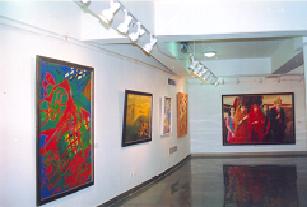General Zorawar
Singh Auditorium :-
 |
| Art Gallery
inside Auditorium |
|
|
 |
| Museum inside
Auditorium |
|
|
General Zorawar Singh Auditorium is the amalgamation
of history, culture and contemporary art. It is indeed a
tribute to the people of Jammu, Kashmir and Ladakh. It is a
matter of pride privilege and pleasure to be the part of this
Auditorium Complex. which promises a rich offering of art and
modern technology.
The Art Gallery is named after Lotsava Rinchen Bzangpo (c.
958-1055 A.D.), a great Scholar and Translator, who was
responsible for the foundation of 108 monasteries (Gompas)
throughout Ladakh, Western Tibet and Lahul Spiti (Himachal
Pradesh). He played a very important role in laying a firm
foundation for Buddhism in Ladakh region and is known as the
'Father of Buddhist Culture in Ladakh'. The monasteries (Gompas)
built by Rinchen Bzangpo are renowned for their architecture,
which includes rich wood carvings and fine wall paintings. The
idea of dedicating this gallery to Lotsava Rinchen Bzangpo is
to propagate his vision towards the Arts. Hence the purpose of
the Gallery is preservation, dissemination and research, which
makes it distinct from other art galleries of the country. The
major collection of the Gallery is of contemporary paintings.
These have been received from the artists who participated in
the "All India Contemporary Artists Camp" at Patnitop (Jammu)
in October 2004, organised by the University of Jammu. The
other collection is black & white photographs, sketches and
paintings which have been donated by renowned artists and art
historians like Prof. S.D.S Charak, Satti Sahni and Serbjeet
Singh. The Art Gallery also houses some beautiful wooden
sculptures, which were carved in the special "Wood Carving
Camp" organised by the University of Jammu in 2005 and
attended by renowned sculptors from all over the country. The
Rinchen Bzangpo Art Gallery is divided into six different
sections according to their theme and artists viz;
Contemporary Paintings, Panorama and Sketches of Serbjeet
Singh, Wall Paintings of Jammu Region, Scroll Paintings (Thangkas),
Pahari Miniature Paintings and Satti Sahni Gallery of
Photographs
The Heritage Museum is named in honour of the great Sufi
saint Sheikh Nur-Ud-Din Noorani (1378-1439 AD), popularly
known as Nund Rishi. He was the propagator of Rishi cult and
devoted his life for the cause of humanity. He derived
inspiration from the holy Quran and gave a distinct Kashmiri
tinge to Islamic doctrines. He propagated the philosophy of
'Unity of Being' and non-violence. Sheikh Nur-ud-Din died in
1439 and was buried with royal pomp at the village of Chrar.
The highlights of the Museum are the display of different
categories of artifacts in a continuous sequence covering the
entire history and culture from pre-historic times to
contemporary. The pre-historic section displays tools from the
sites of Malpur (Jammu) and Burzahom (Kashmir). Some examples
of pre-historic rock petroglyphs of Ladakh are exhibited in a
re-constructed form. Replica of Burzahom pit presents the
unique Neolithic culture of Kashmir. The Historic period of
Jammu is represented by the artifacts belonging to the Kushana
and the Gupta periods excavated from the two sites-Manda and
Ambaran (Akhnoor). The remains of Krimchi temple are recreated
to show the temple tradition of 7th and 8th century AD.
Previous